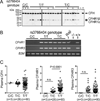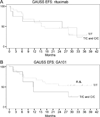Complement-Regulatory Proteins CFHR1 and CFHR3 and Patient Response to Anti-CD20 Monoclonal Antibody Therapy
- PMID: 27528699
- PMCID: PMC5311060
- DOI: 10.1158/1078-0432.CCR-16-1275
Complement-Regulatory Proteins CFHR1 and CFHR3 and Patient Response to Anti-CD20 Monoclonal Antibody Therapy
Abstract
Purpose: Anti-CD20 mAb therapies, including rituximab and obinutuzumab (GA101), are common treatments for follicular lymphoma. In an effort to better understand the role of complement in mAb action, we recently performed germline SNP profiling on 142 follicular lymphoma patients and found rs3766404 genotype correlated with patient response to rituximab. To assess the role of three SNP-associated complement-regulatory proteins (CFH, CFHR1, and CFHR3) in clinical response to anti-CD20 mAb, we studied two cohorts of patients treated with anti-CD20 mAb.Experimental Design: Cohorts included the Iowa/Mayo Lymphoma SPORE observational cohort of subjects with a new diagnosis of follicular lymphoma treated with rituximab and the GAUSS prospective randomized trial cohort of follicular lymphoma subjects randomized to receive single-agent rituximab or obinutuzumab. Circulating protein expression was measured for CFH, CFHR1, and CFHR3 and correlated to clinical outcome.Results: rs3766404 genotype correlated with expression of the related downstream genes CFHR1 and CFHR3 Loss of CFHR1 expression correlated with inferior patient outcome in the observational cohort, but not in the GAUSS cohort. Loss of CFHR3 correlated with superior event-free survival in GAUSS subjects treated with obinutuzumab, but not rituximab.Conclusions: We conclude that the relationship between complement-regulatory proteins CFHR1 and CFHR3 and response to anti-CD20 mAb therapy varies based on the specific anti-CD20 mAb used. We propose that CFHR3 is a candidate biomarker for obinutuzumab response. Further studies are needed to validate these findings and to better understand how complement pathways and complement-regulatory proteins impact on the efficacy of anti-CD20 mAb therapy. Clin Cancer Res; 23(4); 954-61. ©2016 AACR.
©2016 American Association for Cancer Research.
Figures


Similar articles
-
Randomized Phase II Trial Comparing Obinutuzumab (GA101) With Rituximab in Patients With Relapsed CD20+ Indolent B-Cell Non-Hodgkin Lymphoma: Final Analysis of the GAUSS Study.J Clin Oncol. 2015 Oct 20;33(30):3467-74. doi: 10.1200/JCO.2014.59.2139. Epub 2015 Aug 17. J Clin Oncol. 2015. PMID: 26282650 Free PMC article. Clinical Trial.
-
An imbalance of human complement regulatory proteins CFHR1, CFHR3 and factor H influences risk for age-related macular degeneration (AMD).Hum Mol Genet. 2010 Dec 1;19(23):4694-704. doi: 10.1093/hmg/ddq399. Epub 2010 Sep 15. Hum Mol Genet. 2010. PMID: 20843825
-
Obinutuzumab in follicular lymphoma.Drugs Today (Barc). 2016 Dec;52(12):643-651. doi: 10.1358/dot.2016.52.12.2550578. Drugs Today (Barc). 2016. PMID: 28276536 Review.
-
Contribution of copy number variation in the regulation of complement activation locus to development of age-related macular degeneration.Invest Ophthalmol Vis Sci. 2009 Nov;50(11):5070-9. doi: 10.1167/iovs.09-3975. Epub 2009 Jun 24. Invest Ophthalmol Vis Sci. 2009. PMID: 19553609
-
Obinutuzumab in hematologic malignancies: lessons learned to date.Cancer Treat Rev. 2015 Nov;41(9):784-92. doi: 10.1016/j.ctrv.2015.07.003. Epub 2015 Jul 14. Cancer Treat Rev. 2015. PMID: 26190254 Review.
Cited by
-
The miR-590-3p/CFHR3/STAT3 signaling pathway promotes cell proliferation and metastasis in hepatocellular carcinoma.Aging (Albany NY). 2022 Jul 18;14(14):5783-5799. doi: 10.18632/aging.204178. Epub 2022 Jul 18. Aging (Albany NY). 2022. PMID: 35852862 Free PMC article.
-
Molecular Biomarkers in Prediction of High-Grade Transformation and Outcome in Patients with Follicular Lymphoma: A Comprehensive Systemic Review.Int J Mol Sci. 2024 Oct 17;25(20):11179. doi: 10.3390/ijms252011179. Int J Mol Sci. 2024. PMID: 39456961 Free PMC article.
-
Phase 2 multicentre study of single-agent ofatumumab in previously untreated follicular lymphoma: CALGB 50901 (Alliance).Br J Haematol. 2019 Apr;185(1):53-64. doi: 10.1111/bjh.15768. Epub 2019 Feb 5. Br J Haematol. 2019. PMID: 30723894 Free PMC article. Clinical Trial.
-
Past, Present, and Future of Rituximab-The World's First Oncology Monoclonal Antibody Therapy.Front Oncol. 2018 Jun 4;8:163. doi: 10.3389/fonc.2018.00163. eCollection 2018. Front Oncol. 2018. PMID: 29915719 Free PMC article. Review.
-
Serum-integrated omics reveal the host response landscape for severe pediatric community-acquired pneumonia.Crit Care. 2023 Mar 1;27(1):79. doi: 10.1186/s13054-023-04378-w. Crit Care. 2023. PMID: 36859478 Free PMC article.
References
-
- Marcus R, Imrie K, Solal-Celigny P, Catalano JV, Dmoszynska A, Raposo JC, et al. Phase III study of R-CVP compared with cyclophosphamide, vincristine, and prednisone alone in patients with previously untreated advanced follicular lymphoma. Journal of clinical oncology : official journal of the American Society of Clinical Oncology. 2008;26:4579–4586. - PubMed
-
- van Oers MH, Klasa R, Marcus RE, Wolf M, Kimby E, Gascoyne RD, et al. Rituximab maintenance improves clinical outcome of relapsed/resistant follicular non-Hodgkin lymphoma in patients both with and without rituximab during induction: results of a prospective randomized phase 3 intergroup trial. Blood. 2006;108:3295–3301. - PubMed
-
- Robak T. GA-101, a third-generation, humanized and glyco-engineered anti-CD20 mAb for the treatment of B-cell lymphoid malignancies. Current opinion in investigational drugs. 2009;10:588–596. - PubMed
Publication types
MeSH terms
Substances
Grants and funding
LinkOut - more resources
Full Text Sources
Other Literature Sources
Miscellaneous

